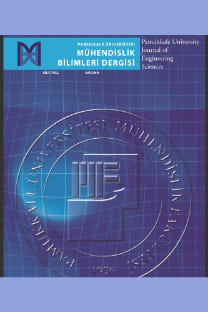Grafen oksit (GO) ve indirgenmiş grafen oksit (RGO) dolgulu PVC kompozitlerin mekanik özelliklerinin karşılaştırılması
Grafen oksit (GO), İndirgenmiş grafen oksit (RGO), PVC kompozit, Mekanik özellikler
A comparison study on mechanical properties of PVC composites filled by graphene oxide (GO) and reduced graphene oxide (RGO)
___
- Marathe DS, Joshi PS. “Characterization of highly filled wood flour-PVC composites: Morphological and thermal studies”. Journal of Applied Polymer Science, 11(1), 90-96, 2009.
- Janajreha I, Alshraha M, Zamzam S. “Mechanical recycling of PVC plastic waste streams from cable industry: A case study”. Sustainable Cities and Society, 18, 13-20, 2015.
- Wang H, Xie G, Fang M, Ying Z, Tong Y, Zeng Y. “Electrical and mechanical properties of antistatic PVC films containing multi-layer graphene”. Composites Part B, 79, 444-450, 2015.
- Hu J, Jia X, Li C, Ma Z, Zhang G, Sheng W, Zhang X, Wei Z. “Effect of interfacial interaction between graphene oxide derivatives and poly(vinyl chloride) upon the mechanical properties of their nanocomposites”. Journal of Materials Science, 49(7), 943-2951, 2014.
- Deshmukh K, Joshi GM. “Thermo-mechanical properties of poly (vinyl chloride)/graphene oxide as high performance nanocomposites”. Polymer Testing, 34, 211-219, 2014.
- Zhu Y, Murali S, Cai W, Li X, Suk JW, Potts JR, Ruoff RS. “Graphene and Graphene Oxide: Synthesis, Properties, and Applications”. Advances Materials, 22, 3906-3924, 2010.
- Kim F, Cote LJ, Huang J. “Graphene Oxide: Surface Activity and Two-Dimensional Assembly”. Advances Materials, 22, 1954-1958, 2010.
- Joshi GM, Deshmukh K. “Optimized Quality Factor of Graphene Oxide-Reinforced PVC Nanocomposite”. Journal of Electronic Materials, 43(4), 1161-1165, 2014.
- Jin Y, Huang S, Zhang M, Jia M, Hu D. “A Green and Efficient Method to Produce Graphene for Electrochemical Capacitors From Graphene Oxide Using Sodium Carbonate As A Reducing Agent”. Applied Surface Science, 268, 541-546, 2013.
- Wang H, Yuan X, Wu Y, Huang H, Peng X, Zeng G, Zhong H, Liang J, Ren M. “Graphene-Based Materials: fabrication, characterization and application for the decontamination of wastewater and wastegas and hydrogen storage/generation”. Advances in Colloid and Interface Science, 195-196, 19-40, 2013.
- Singh V, Joung D, Zhai L, Das S, Khondaker SI, Seal S. “Graphene Based Materials: Past, Present and Future”. Progress in Materials Science, 56, 1178-1271, 2011.
- Dağcı K. Poli (Pyronin Y) Ince Filmlerinin ve Müstakil Grafen/Poli(Pyronin Y)/Gümüş Nanopartikül Elektrotların Hazırlanması, Karakterizasyonu ve Nitritin Amperometrik Tayininde Kullanılması. Doktora Tezi, Atatürk Üniversitesi, Erzurum, Türkiye, 2015.
- Liu Y, Zhang Y, Ma G, Wang Z, Liu K, Liu H. “Ethylene glycol reduced graphene oxide/polypyrrole composite for supercapacitor”. Electrochimica Acta, 88, 519-525, 2013.
- Kamisan AI, Kamisan AS, Ali RMd, Tunku Kudin TI, Hassan OH, Halim NA, Yahya MZA. “Synthesis of graphene via green reduction of graphene oxide with simple sugars”. Advanced Materials Research, 1107, 542-546, 2015.
- Wang Y, Shi Z, Yin J. “Facile Synthesis of soluble graphene via a green reduction of graphene oxide in tea solution and its biocomposites”. ACS Applied Materials & Interfaces, 3, 1127-1133, 2011.
- Fernandez-Merino MJ, Guardia L, Paredes JI, Villar-Rodil S, Solis-Fernandez P, Martinez-Alonso A, Tascon JMD. “Vitamin C is an ideal substitute for hydrazine in the reduction of graphene oxide suspensions”. Journal of Physical Chemistry C, 114, 6426-6432, 2010.
- Hummers WS, Offeman RE. “Preparation of graphitic oxide”. Journal of the American Chemical Society, 80(6), 1339,1958.
- Gurunathan S, Han JW, Kim E, Kwon DN, Park JK, Kim JH. “Enhanced green fluorescent protein-mediated synthesis of biocompatible graphene”. Journal of Nanobiotechnology, 12(41), 1-16, 2014.
- Vadukumpully S, Paul J, Mahanta N, Valiyaveettil S. “Flexible conductive graphene/poly(vinyl chloride) composite thin films with high mechanical strength and thermal stability”. Carbon, 49, 198-205, 2011.
- Bora C, Bharali P, Baglari S, Dolui SK, Konwar BK. “Strong and conductive reduced graphene oxide/polyester resin composite films with improved mechanical strength, thermal stability and its antibacterial activity”. Composites Science and Technology, 87, 1-7, 2013.
- Safarpour M, Khataee A, Vatanpour V. “Thin film nanocomposite reverse osmosis membrane modified by reduced graphene oxide/TiO2 with improved desalination performance”. Journal of Membrane Science, 489, 43-54, 2015.
- Li D, Zhang B, Xuan F. “The sequestration of Sr(II) and Cs(I) from aqueous solutions by magnetic graphene oxides”. Journal of Molecular Liquids, 209, 508-514, 2015.
- Zheng YT, Cao DR, Wang DS, Chen JJ. “Study on the interface modification of bagasse fibre and the mechanical properties of its composite with PVC”. Composites: Part A, 38, 20-25, 2007.
- Duttagupta SP, Chen XL, Jenekhe SA, Fauchet PM. “Microhardness of porous silicon films and composites”. Solid State Communications, 101, 33-37, 1997.
- Crespo JE, Sanchez L, Garcıa D, Lopez J. “Study of the mechanical and morphological properties of plasticized pvc composites containing rice husk fillers”. Journal of Reinforced Plastics and Composites, 27(3), 229-243, 2008.
- ISSN: 1300-7009
- Başlangıç: 1995
- Yayıncı: PAMUKKALE ÜNİVERSİTESİ
Bayes ağları ile futbol analitiği: FutBA modeli
Yapıştırma bağlantılı kompozitlerde yapıştırma geometrisininin gerilme dağılımına etkisi
Gezgin satıcı probleminin melez akışkan genetik algoritma (MAGA) kullanarak çözümü
Gerçek bir sınav çizelgeleme problemi için iki aşamalı çözüm yaklaşımı
Rahime SANCAR EDİS, Emrah Bünyamin EDİS
Fe3O4/FeO/CoNi kompozit malzemenin sentezi ve manyetik özelliklerinin incelenmesi
Spor giyim sektöründe marka tercihlerine ve tercih nedenlerine saklı Markov modelinin uygulanması
Drone ile teslimat rotalaması için bir matematiksel model
Sinem HAN, Begüm ÖZER, Barış ALİOĞLU, Özgür POLAT, Ayşe Tülin AKTİN
Biyodizel kaynaklı korozyon ve bozunma: Bir inceleme
Muhammet Kaan YEŞİLYURT, İlhan Volkan ÖNER, Efe Çetin YILMAZ
Çapraz sevkiyatta kamyon çizelgeleme problemi için çözüm yaklaşımları
